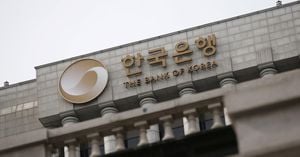The diplomatic tension surrounding the Ukraine conflict continues as recent developments signal both challenges and opportunities for peace discussions involving the U.S. and Russia. A major highlight was the UN Security Council's approval of a resolution backed by the Trump administration, which curiously did not label Russia as the aggressor.
The resolution passed with 10 out of 15 votes from council members. This marked the first time the council reached a consensus on the Ukrainian crisis, reflecting unprecedented collaboration between the U.S., Russia, and China, whilst Europe remained divided: the UK and France chose to abstain from voting.
The resolution, titled “The Path to Peace,” called for the cessation of hostilities, without mandatorily demanding Russian troop withdrawal. This raised eyebrows globally as previous debates at the General Assembly resulted in calls for Russia to be recognized as the aggressor. France's President Emmanuel Macron reported 'substantial progress' after his discussions with Trump, stating detailed talks focused on creating lasting security guarantees and peace strategies for Ukraine could be underway.
“I believe this was a turning point in our discussions,” Macron said, emphasizing the need for European support and security commitments. Interestingly, Trump mentioned, “Yes, he would accept it” when queried if Putin would be agreeable to European peacekeeping troops helping enforce any future ceasefire.
Meanwhile, Ukrainian President Volodymyr Zelenskyy faced mixed reactions at home. A resolution to support him at the Ukrainian Parliament failed to garner the necessary votes, reflecting internal dissent amid the continuing conflict and fraught relationships with various factions. Yet, Zelenskyy has exhibited remarkable resilience, asserting his readiness to resign if it meant achieving Ukraine's NATO membership: “If it is absolutely necessary for me to resign, I am ready to do so,” he noted during a press conference, showing commitment to prioritizing Ukraine’s future over his political standing.
The backdrop against which these discussions are taking place is not merely about military posturing; it includes complex negotiations on mineral agreements where Ukraine insists on security guarantees from the U.S. Recent comments from Olha Stefanischyna, Ukraine's Deputy Prime Minister, indicated negotiations have been progressing well. “We have constructive negotiations, and almost all important details have been clarified,” she said, hinting at fruitful discussions aimed at stabilizing the economy and affirming geopolitical alliances.
The presence of Turkey's President Erdogan as a potential mediator adds another layer to this diplomatic situation. Erdogan has consistently offered Turkey's role as the host for renewed negotiations, indicating he wishes to regain Turkey's influence on the global stage.
Despite these glimmers of hope, the stark reality persists, as recent data from the EU raises alarm about more funds being oriented toward Russian fossil fuels than Ukraine’s support, highlighting the stark economic divides underscored by the protracted war. Analysts point out this raises questions about genuine international commitment toward supporting Ukraine’s sovereignty against external aggression.
Looking forward, the next steps remain uncertain, especially with diplomatic engagements scheduled across different nations, including follow-up meetings planned between U.S. and Russian delegates. With the third anniversary of Russia's invasion approaching, the world is credibly watching how these high-stakes discussions could reshape the future of the region.
While both nations gear up for continued negotiations, the hope for peace is tempered by political realities and the contrasting narratives playing out on the ground—and future dialogues will be pivotal.



